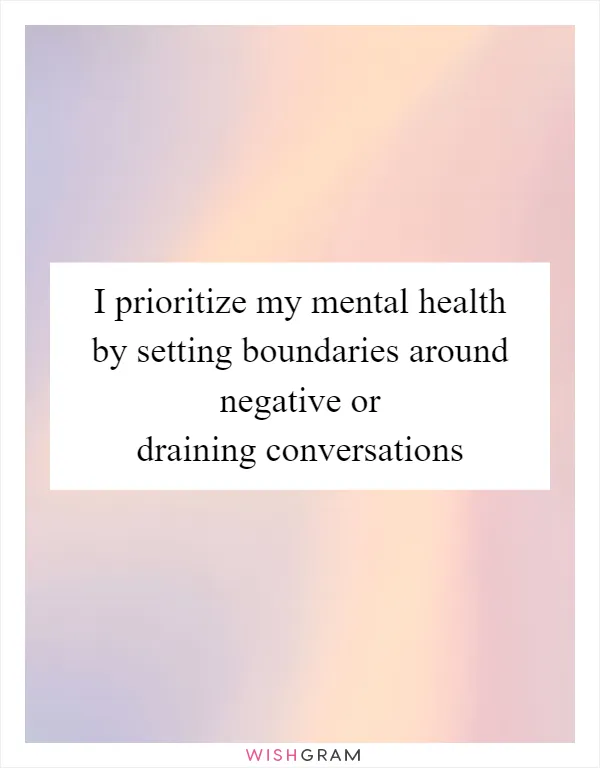I prioritize my mental health by setting boundaries around negative or draining conversations
Prioritizing your mental health by setting boundaries around negative or draining conversations is a powerful act of self-care that allows you to protect your emotional well-being and maintain a positive mindset. By consciously managing the type of conversations you engage in, you create a space that fosters positivity, growth, and a healthy mental state.
Recognize the impact of conversations on your mental health. Conversations have the power to influence your thoughts, emotions, and overall well-being. Negative or draining conversations can leave you feeling drained, anxious, or overwhelmed. It's important to acknowledge the impact that these conversations can have on your mental health and take proactive steps to protect yourself.
Set clear boundaries for the types of conversations you are willing to participate in. Reflect on your values, priorities, and personal boundaries. Identify the topics or dynamics that tend to be draining or negative for you. It could include gossip, excessive complaining, judgmental discussions, or conversations that consistently focus on negativity. Determine what is acceptable and what is not, and commit to upholding those boundaries.
Communicate your boundaries assertively and respectfully. When faced with a conversation that goes against your mental health boundaries, express your position calmly and assertively. You can politely redirect the conversation to a more positive or constructive topic, or kindly decline participation in the discussion. Remember that setting boundaries is not about being rude or dismissive, but about prioritizing your well-being.
Seek out positive and uplifting conversations. Surround yourself with individuals who support your mental well-being and engage in conversations that are inspiring, uplifting, and growth-oriented. Connect with people who share similar values and have a positive outlook on life. Seek out discussions that foster personal growth, problem-solving, and empathy.
Practice active listening and empathy. When engaging in conversations, be mindful of your own responses and reactions. Listen attentively to others and try to understand their perspectives without absorbing or internalizing negative energy. Practice empathy and compassion, while also recognizing when it is necessary to disengage from conversations that may be detrimental to your mental health.
Focus on solutions and positivity. If you find yourself in a conversation that starts to turn negative or draining, try to shift the focus towards solutions, positive aspects, or alternative perspectives. Encourage constructive dialogue and seek ways to contribute positively to the conversation. By redirecting the energy towards solutions and positive outcomes, you can help create a more supportive and uplifting atmosphere.
Engage in activities that promote mental well-being. Alongside setting boundaries around negative conversations, prioritize activities that enhance your mental health, such as meditation, mindfulness, exercise, hobbies, and spending time with supportive friends or loved ones. These activities can help you maintain a positive mindset and build emotional resilience, enabling you to better navigate challenging conversations when they do arise.
Remember that setting boundaries around negative or draining conversations is not selfish; it is an essential act of self-care. By protecting your mental health and surrounding yourself with positivity, you create an environment that nurtures your well-being and allows you to thrive. Embrace the power of healthy boundaries and prioritize conversations that contribute to your growth, happiness, and mental peace.
